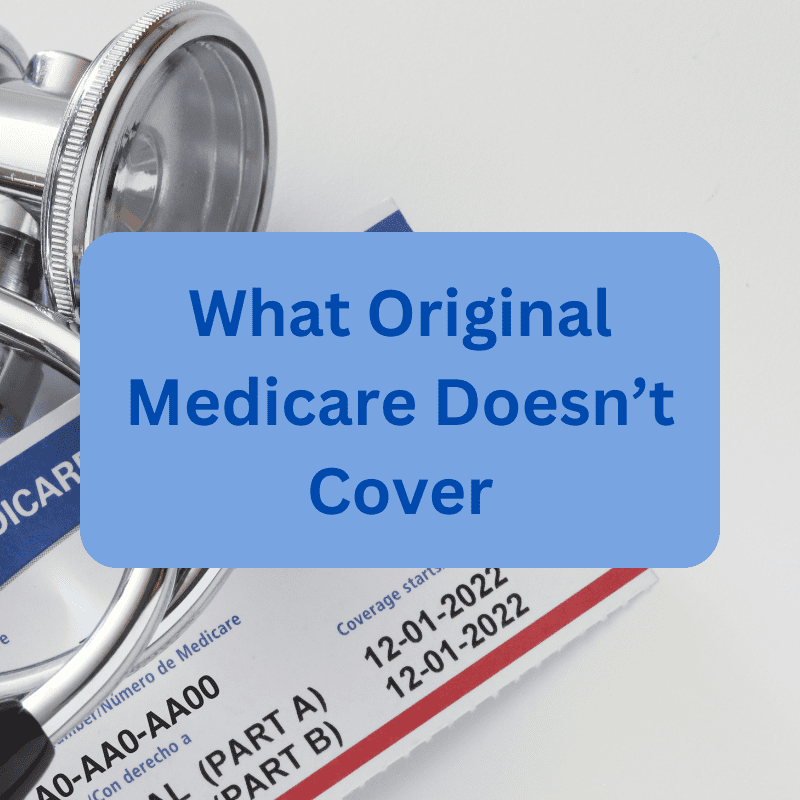Navigating the world of Medicare can be overwhelming, especially when it comes to understanding what is and isn’t covered. While Original Medicare (Parts A and B) offers essential coverage, many people are surprised to discover gaps in what it provides. In this blog, we’ll explore what Original Medicare doesn’t cover and why having a Medicare Supplement plan, along with ancillary insurance like dental, vision, hearing, and long-term care, is a smart choice for comprehensive coverage.
What Original Medicare Doesn’t Cover
Original Medicare is designed to cover the basics of hospital and medical care, but it leaves out several important areas that can lead to significant out-of-pocket costs. Here’s what Original Medicare typically doesn’t cover:
Dental Care: Routine dental care, including cleanings, fillings, and dentures, are not covered by Medicare. This can be a significant expense as dental health often deteriorates with age.
Vision Care: While Medicare covers some eye conditions like cataracts, it doesn’t cover routine eye exams, glasses, or contact lenses. For those with vision problems, this can add up quickly.
Hearing Care: Hearing aids and routine hearing exams are not covered by Original Medicare. Considering the cost of hearing aids, this is a crucial gap in coverage.
Prescription Drugs: Original Medicare doesn’t cover most outpatient prescription drugs. For this, you’d need to enroll in a separate Medicare Part D plan.
Long-Term Care: Medicare does not cover long-term care services, such as assistance with daily living activities (e.g., bathing, dressing, or eating) at home or in a nursing home.
International Travel: If you travel outside the U.S., Original Medicare generally won’t cover any medical costs incurred abroad.
Why You Need Medicare Supplement Insurance
Medicare Supplement insurance, also known as Medigap, is designed to fill in the gaps left by Original Medicare. Here’s why it’s a smart investment:
Covers Out-of-Pocket Costs: Medigap helps cover deductibles, copayments, and coinsurance that you’d otherwise have to pay out of pocket. This can save you a significant amount of money, especially if you require frequent medical care.
Broadens Your Coverage: Some Medigap plans offer coverage for services like emergency care during foreign travel, which Original Medicare does not cover.
Flexible Provider Access: With a Medigap plan, you can see any doctor or specialist who accepts Medicare, giving you more flexibility compared to some other insurance options.
The Importance of Ancillary Insurance
In addition to Medigap, ancillary insurance policies for dental, vision, hearing, and long-term care are essential for ensuring you have comprehensive coverage. Here’s why:
Dental Insurance: Regular dental check-ups and procedures are crucial for overall health, and dental insurance can help reduce the cost of these services.
Vision Insurance: Regular eye exams are essential for detecting vision problems early. Vision insurance can help cover the cost of exams, glasses, and contact lenses.
Hearing Insurance: As we age, hearing loss becomes more common. Hearing insurance can help cover the cost of hearing aids and exams, making it easier to maintain your quality of life.
Hospital Indemnity: Medicare doesn’t cover all expenses if you’re admitted to the hospital, which often leaves many people facing unexpected out-of-pocket medical costs. A hospital indemnity plan offers additional coverage to help with expenses related to hospital stays, skilled nursing care, hospital observation, and emergency room visits.
Long-Term Care Insurance: With life expectancy increasing, the likelihood of needing long-term care services rises. Long-term care insurance can protect your savings and assets by covering the cost of care that Medicare doesn’t.
Conclusion
While Original Medicare provides a strong foundation for health coverage, it’s clear that there are significant gaps that could lead to unexpected costs. By investing in a Medicare Supplement plan and ancillary insurance, you can protect yourself from these potential financial burdens and ensure you have access to the care you need.
As a licensed health insurance expert, I always recommend taking the time to evaluate your healthcare needs and exploring options that provide comprehensive coverage for your peace of mind. If you’re interested in learning more about Medicare Supplement plans or Ancillary Insurance and how they can benefit you, feel free to schedule an appointment or call our office.
Remember, the best way to stay healthy and financially secure is to be prepared.
Retire Happy!
Mike

